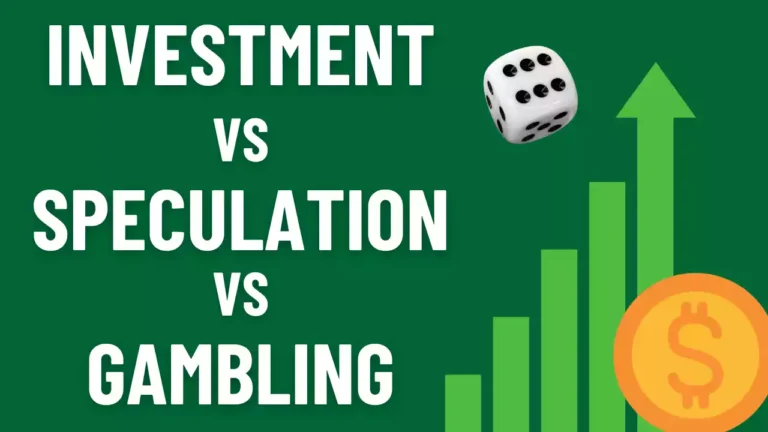When it comes to financial choices in India, it can be challenging to understand the differences between Investment vs Speculation vs Gambling. While these activities may seem similar at first glance, they are fundamentally distinct, each with its unique characteristics and potential outcomes.
Investment offers a way to achieve financial growth over the long-term, while speculation focuses on short-term gains through market predictions. Gambling, on the other hand, involves chance and luck as players bet on various outcomes.
Understanding the differences between these activities is critical in making informed financial decisions in India. In this article, we will explore the various aspects of Investment vs Speculation vs Gambling to help you make strategic financial choices.
Key Takeaways on Investment vs Speculation vs Gambling
- Investment, speculation, and gambling are fundamentally distinct activities.
- Investment focuses on long-term growth, while speculation relies on short-term market predictions.
- Gambling involves chance and luck in selecting outcomes.
- Making informed financial decisions in India requires understanding the differences between these activities.
What is Investment?
Investment is the process of allocating resources, including time and money, with the aim of generating financial growth over the long-term. Unlike speculation or gambling, investment requires a strategic approach, careful analysis, and effective risk management to achieve sustainable returns.
Effective risk management is a crucial aspect of investment, as all investments carry some level of risk. By diversifying your portfolio across different assets, you can mitigate risk and potentially increase your chances of success.
The focus of investment is on long-term goals, such as saving for retirement, funding education, or building wealth over time. Unlike short-term gains that come with a high degree of uncertainty, long-term investment strategies aim to deliver consistent returns with lower levels of risk.
Some popular investment vehicles in India include stocks, bonds, mutual funds, and real estate. Each investment type has its unique features, benefits, and risks, which we will discuss in the upcoming sections.
In summary, investing is an essential tool for achieving financial security and growth over the long-term. By adopting a strategic approach and practicing effective risk management, you can build a diversified portfolio that aligns with your financial goals and aspirations.
Types of Investments
Investing your money is one of the best ways to prepare for a secure financial future. There are several types of investments available in India that you can choose from to grow your assets.
Stocks
Stocks, also referred to as equity or shares, represent a portion of ownership in a company. When you purchase a stock, you become a shareholder and have a stake in the company’s success. The value of your stock may increase or decrease depending on the performance of the company.
Bonds
Bonds are a type of debt instrument that companies or governments issue to raise capital. When you buy a bond, you are essentially lending money to the issuer, who agrees to pay you back with interest. Bonds are considered less risky than stocks but typically offer lower returns.
Real Estate
Investing in real estate involves purchasing property, such as a house or apartment, with the intention of generating rental income or selling it at a profit. Real estate investments can provide a steady stream of income and offer tax benefits but require significant upfront capital.
Mutual Funds
Mutual funds pool money from multiple investors to purchase a diversified portfolio of stocks, bonds, and other securities. By investing in mutual funds, you can gain exposure to a diverse range of assets without having to manage them yourself. Mutual funds vary in risk and return, so it’s essential to choose one that aligns with your investment goals.
In summary, choosing the right investment option requires careful consideration of your financial goals, risk tolerance, and investment horizon. It would be best to consult with financial experts to ensure you make informed investment decisions.
Investment Strategies
When it comes to investing, having a clear investment strategy is crucial. Investment strategies can help you manage risk and increase your chances of achieving your financial goals. Let’s explore some of the most important investment strategies that you can use:
Diversification
Diversification is the practice of spreading your investments across different asset classes, such as stocks, bonds, and real estate. This strategy can help you manage risk and reduce the impact of market volatility on your portfolio. By diversifying your investments, you can help ensure that you don’t put all your eggs in one basket.
Asset Allocation
Asset allocation refers to the process of dividing your investments among different asset classes based on your investment goals and risk tolerance. This strategy can help you create a well-balanced portfolio that aligns with your long-term goals.
Market Timing
Market timing involves trying to predict when the markets will rise or fall and making investment decisions accordingly. While this strategy can lead to short-term gains, it’s often difficult to execute successfully over the long term. For most investors, a better approach is to focus on their long-term goals and stick to a well-defined investment strategy.
In conclusion, selecting the right investment strategy requires careful consideration of your investment goals, risk tolerance, and time horizon. By diversifying your investments, allocating your assets appropriately, and avoiding market timing, you can increase your chances of success and achieve your financial objectives.
Risks Associated with Investments
Investing is crucial for achieving financial growth, but it’s not without risk. Being aware of investment risks can help you make informed decisions and mitigate potential losses.
Market volatility: This is when the market experiences sudden and significant price fluctuations due to various factors such as economic indicators, political events, and natural disasters. This can lead to losses in the short term but can also present opportunities for long-term gains.
| Investment Risks | Description |
|---|---|
| Inflation | When the rate of inflation rises, the purchasing power of your investments may decrease, reducing the real value of your returns. |
| Liquidity risk | Some investments, such as real estate, may not be easily sold or converted into cash, making them illiquid. This can pose a risk if you need to access your funds quickly. |
While risk cannot be eliminated entirely, it can be managed through diversification, asset allocation, and other investment strategies. It’s important to consult with a financial advisor and conduct thorough research before making any investment decisions.
What is Speculation?
Speculation refers to the practice of making high-risk investments with the anticipation of enjoying short-term gains. It involves an element of uncertainty and is often based on market predictions, which can be unreliable. Speculative investments may include options, futures, currencies, and commodities.
Unlike investment, speculation does not usually involve a long-term strategy, and the focus is on making a quick profit. This makes it a risky proposition, as there is no guarantee of making a profit, and losses can be significant.
It is essential to note that speculation is not the same as gambling, as there is still an element of analysis and data involved in the decision-making process. However, it is still riskier than traditional investment and may not be suitable for everyone.
“The four most dangerous words in investing are: ‘this time, it’s different.'” -Sir John Templeton
Difference Between Investment and Speculation
When it comes to making financial decisions, it is essential to understand the difference between investment and speculation. While both involve putting money into assets with the hope of generating returns, there are key differences to consider. One primary difference is the focus on long-term goals versus short-term gains. Investments typically aim to achieve long-term financial growth and stability, while speculation often involves a high degree of risk for short-term profits.
Another crucial difference is the distinction between risk and uncertainty. Investment involves risk management, where investors try to minimize their exposure to potential losses. In contrast, speculation often involves uncertainty, where investors are taking a calculated guess based on incomplete information.
Table: Comparison of Investment and Speculation
| Criteria | Investment | Speculation |
|---|---|---|
| Time Horizon | Long-term | Short-term |
| Focus | Financial stability and growth | High risk and potential profit |
| Risk vs Uncertainty | Risk management through diversification and asset allocation | Calculated guess based on incomplete information |
When deciding between investment and speculation, it is crucial to assess your financial goals, risk tolerance, and time horizon. If you are looking for long-term stability and growth, investment may be the better choice. However, if you are willing to take risks for short-term gains, speculation may be worth considering.
What is Gambling?

Gambling is a popular form of entertainment that involves a chance element in winning or losing money. It can take various forms, including casino games, sports betting, and lottery.
Casinos offer a wide range of games of chance, such as blackjack, poker, baccarat, and slot machines, where the outcome is determined by luck rather than skill. Sports betting involves predicting the outcome of a sports match and placing a wager on it. The lottery is a form of gambling that involves drawing numbers randomly for a prize.
While gambling can provide excitement and a chance for a big payoff, it involves a significant risk element. Unlike investment and speculation, where the outcome is influenced by various factors such as asset allocation and market timing, gambling outcomes are purely chance-based.
When engaging in gambling, it is crucial to approach it as a form of entertainment rather than a means of generating income. It is also essential to set a budget and stick to it, avoiding the temptation to chase losses.
Investment vs Gambling
While investment and gambling may both involve taking risks, they are fundamentally different activities that require distinct approaches. Investment is all about strategic decision-making and effective risk management, while gambling is much more reliant on chance and luck.
When you choose to invest your money, you are making a deliberate decision aimed at achieving long-term financial growth. This involves carefully considering various investment options, analyzing market trends, and diversifying your portfolio to minimize risk. In contrast, gambling is typically focused on short-term gains and involves placing bets on uncertain outcomes.
It’s important to recognize that while investing always involves some degree of risk, it can be significantly reduced through careful planning and decision-making. This is where effective risk management comes into play, with strategies like asset allocation and market timing being used to manage potential risks. In contrast, gambling involves betting on unpredictable outcomes, with very little control over potential losses.
To sum it up, investment and gambling are two very different activities with distinct characteristics and outcomes. While investing requires strategic decision-making and risk management, gambling is a much more unpredictable endeavour that is based on chance and luck.
Conclusion on Investment vs Speculation vs Gambling
It is crucial to understand the differences between investment, speculation, and gambling when making financial choices in India. Investment is a strategic decision-making process that focuses on long-term goals and effective risk management for financial growth. In contrast, speculation involves high-risk short-term gains through market predictions, while gambling relies on chance and luck as a form of entertainment.
By choosing to invest, you can diversify your portfolio and employ various investment strategies like asset allocation, which can help you achieve your financial goals. However, it is also essential to understand the potential risks associated with investments, such as market volatility and liquidity risk.
Comparing investment, speculation, and gambling highlights the importance of making informed financial choices in India. By understanding the differences, you can make strategic decisions that balance risk and reward and focus on long-term financial growth. So, whether you are a beginner or an experienced investor, always prioritize research, risk management, and a long-term perspective when investing in the Indian market.
FAQs related on Investment vs Speculation vs Gambling
What is the difference between investment, speculation, and gambling?
Investment, speculation, and gambling are three distinct activities that involve financial choices. Investment focuses on long-term goals, financial growth, and risk management, while speculation involves high-risk, short-term gains through market predictions. Gambling, on the other hand, is based on chance and luck and is primarily considered a form of entertainment.
What is investment and why is it important?
Investment refers to the allocation of funds with the expectation of generating returns over time. It is crucial for achieving financial growth and securing future goals. By investing wisely, individuals can grow their wealth, preserve purchasing power, and mitigate the impact of inflation.
What are the types of investments available?
There are various types of investments available, including stocks, bonds, real estate, and mutual funds. Stocks represent ownership in a company, while bonds are a form of debt. Real estate involves property ownership, and mutual funds pool money from multiple investors to invest in a diversified portfolio.
What are some investment strategies for success?
Successful investment strategies include diversification, which involves spreading investments across different asset classes, and asset allocation, which aims to balance risk and reward. Market timing, or attempting to predict market movements, is often discouraged as it can be challenging to execute consistently.
What are the risks associated with investments?
Investments carry various risks, including market volatility, inflation, and liquidity risk. Market volatility refers to rapid and significant price fluctuations, which may result in losses. Inflation erodes purchasing power, and liquidity risk relates to the ability to convert investments into cash without significant loss.
What is speculation, and how does it differ from investment?
Speculation involves taking high risks with the expectation of short-term gains based on market predictions. Unlike investment, speculation typically focuses on rapid profit generation rather than long-term financial growth. Speculators often engage in trading activities with a higher degree of uncertainty.
What is the difference between investment and speculation?
The main difference between investment and speculation lies in their objectives and time horizons. Investment aims for long-term financial growth and stability, while speculation seeks short-term gains through market predictions. Furthermore, investment involves risk management and strategic decision-making, while speculation leans more towards uncertainty and chance.
What is gambling, and how does it differ from investment and speculation?
Gambling is an activity primarily driven by chance and luck, where participants place bets on uncertain outcomes. Unlike investment and speculation, gambling is not typically considered a strategic financial decision but rather a form of entertainment. While investment and speculation involve financial risk, gambling relies heavily on luck and lacks long-term financial growth as a goal.
Why is understanding the difference between investment, speculation, and gambling important?
Understanding the differences between investment, speculation, and gambling is crucial in making informed financial choices. By being aware of the characteristics, objectives, and risks associated with each activity, individuals can navigate the financial landscape more effectively and make decisions aligned with their goals and risk tolerance.
Is it possible to combine investment and gambling?
It is generally advisable to keep investment and gambling separate. Investment involves strategic decision-making, risk management, and a focus on long-term financial growth, whereas gambling relies on chance and luck. Combining the two activities can potentially jeopardize investment objectives and expose individuals to unnecessary risks.

